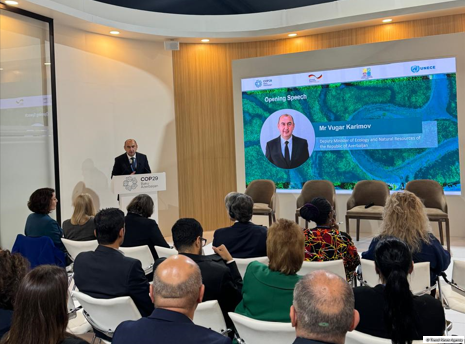BAKU, Azerbaijan, November 21. An event on "The Role of Climate-Informed Transboundary Water Management in Ensuring the Progress of the United Arab Emirates in the Framework of Global Resilience to Climate Change" was organized as part of the 29th session of the Conference of the Parties to the UN Framework Convention on Climate Change (COP29) in Baku, Trend reports.
At the event, Vugar Kerimov, Azerbaijan's Deputy Minister of Ecology and Natural Resources, drove home the point that water resource issues are a can of worms on a global scale. He pointed out that the writing is on the wall when it comes to climate change, as it’s throwing a wrench in the works for both agriculture and our drinking water supply.
"Approximately 2 billion individuals globally lack access to clean water, with difficulties intensified by population increase, urbanization, poor water utilization, and pollution. Azerbaijan, a nation with constrained natural water resources, has prioritized the sustainable management of water. Azerbaijan has undertaken several significant initiatives to tackle these challenges, including the formation of the Commission on Efficient Use of Water Resources in April 2020, the establishment of the Azerbaijan State Water Resources Agency in 2023, and the endorsement of the "National Strategy for the Efficient Use of Water Resources."These efforts demonstrate the nation's dedication to the responsible management of its water resources.
While Azerbaijan has made significant strides in this area, there are still substantial hurdles ahead, including the impacts of global climate change and the increasing water demand. To meet these challenges, Azerbaijan is focusing on water reuse, the integration of green technologies, and fostering regional cooperation. Like many countries, Azerbaijan faces the dual issues of water resource depletion and their uneven distribution. This makes the coordinated management of transboundary rivers and watersheds essential. Such cooperation is crucial not only for the sustainable use of water resources but also for developing joint solutions to mitigate the effects of climate change," he said.
The Deputy Minister drove home that a hefty chunk, about 60 percent, of the globe's freshwater resources is in the hands of two or more nations, with more than 150 countries depending on these shared water bodies to keep their heads above water. These lifeblood resources are not just the bread and butter for millions, but they also keep the wheels turning in crucial sectors like agriculture, energy, and industry.
"Water-related issues driven by climate change underscore the urgent need for global cooperation among states and organizations. The UNECE Convention on the Protection and Use of Transboundary Watercourses and International Lakes, adopted in 1992, laid a critical international legal foundation for the sustainable and effective management of transboundary water resources.
For Azerbaijan, managing transboundary waters is a strategic priority. Several major transboundary rivers, including the Khakarichay, Bargushadchay, Okhchuchay, Kura, and Araz, flow into the Caspian Sea downstream of the country. These rivers play a key role in the socio-economic development of the entire region. However, Armenia has heavily polluted the Okhchuchay River for many years, posing a significant threat to the ecosystem and water security across the region.
Azerbaijan places significant emphasis on cooperative management of transboundary water resources based on international legal principles and has been a member of the UN Water Convention since 2000. Unfortunately, the lack of participation from other countries in the region has hindered meaningful cooperation, limiting opportunities for sustainable water management.
Given that transboundary rivers provide around 70 percent of the country's water resources, Azerbaijan's membership in the UN Water Convention is strategically significant. The potential for cross-border cooperation under international law is crucial for addressing the challenges of shared water management. Achieving fair and sustainable management of transboundary waters is not the responsibility of any one nation but of the entire region. We must intensify our collective efforts to succeed.
The fact that we have gathered here today demonstrates our collective readiness to collaborate, share knowledge, and exchange experiences. I am confident that the discussions at this event will open up new avenues for cooperation in transboundary water management, helping to build a more sustainable future for the region as a whole,” he added.
The 29th session of the Conference of the Parties to the UN Framework Convention on Climate Change (COP29), which will run until November 22, opened at the Baku Olympic Stadium on November 11.
The main expectation from COP29 is to agree on a fair and ambitious New Collective Quantitative Goal (NCQG) on climate finance.
The UN Framework Convention on Climate Change is an agreement signed at the Rio Earth Summit in June 1992 to prevent dangerous human interference in the climate system. The acronym COP (Conference of Parties) stands for “Conference of Parties” and is the highest legislative body overseeing the implementation of the Framework Convention on Climate Change.
A total of 198 countries are parties to the Convention. Unless otherwise decided by the parties, COP is held annually. The first COP event was held in March 1995 in Berlin, and its secretariat is located in Bonn.
Stay up-to-date with more news on Trend News Agency's WhatsApp channel







